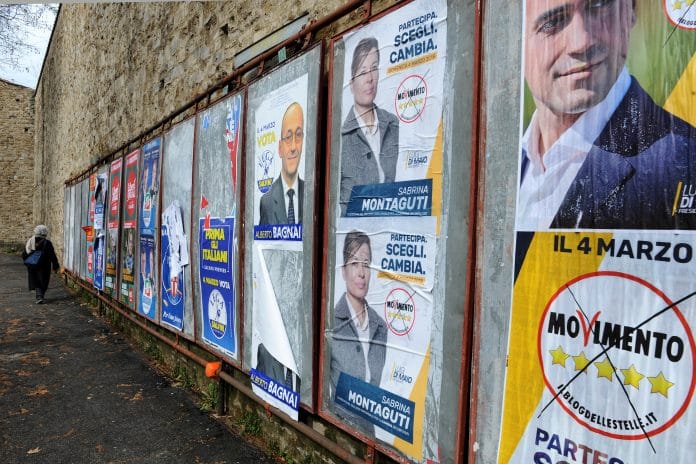The most popular among limited choices
“Exit polling from the Italian general election on March 4th signalled that the anti-establishment Five Star Movement (M5S) had emerged as far and away the largest political force in the country and that mainstream parties of left and right could expect chastening reverses,” writes The Economist.
If the exit polls turn into real results, Italy would be looking at Luigi Di Maio, the M5S’s 31 year old leader, as Prime Minister. “But with no party, or electoral grouping, looking likely to have won a majority of seats, Italy may have to wait a good few weeks to find out what kind of government it will get next.”
“Signs of a swing towards the M5S emerged earlier as turnout figures came in showing high volumes of participation in the south where the maverick movement is strongest. Founded by a comedian, Beppe Grillo, the M5S refuses to define itself as either left- or right-wing—terms it argues have become outdated. Mr Di Maio recently shelved its demand for a referendum on Italy’s membership of the euro, but there is still plenty in its electoral programme to rattle markets, notably proposals that would add several tens of billions of euros to Italy’s budget deficit and its already dauntingly high public debt, of around 130% of GDP.”
“An additional concern is that taken together, the various anti-EU parties—Five Star, the League and the far-right Brothers of Italy—look to have won close to or even slightly above 50% of the vote.”
Setting himself up for failure?
“There’s a reason US presidents can leave office at the pinnacle of their success, while British prime ministers trundle on until they inevitably fail,” writes Tom Holland in the South China Morning Post. The reason for this “transatlantic divergence”, he writes, “is that American presidents have term limits on their years in office. British prime ministers do not. In the US, presidents must step down after a maximum of two four-year terms in the White House. In Britain, prime ministers tend to stay in the job until involuntarily ousted. That is why their careers inevitably end in failure.”
“Now, by scrapping term limits on China’s presidency, Xi Jinping has made it a great deal more likely that his own political career will end in ignominious failure,” Holland predicts.
“The standard Xi will be judged by is whether he can realise his “Chinese dream” of the “great renewal of the Chinese nation”. This is usually described nebulously as building “a great modern socialist country”. But Xi’s objective is clear: he wants China to become a global economic, political and military superpower.”
“In short, the economy will struggle to sustain the growth rates needed to realise Xi’s Chinese dream. And Xi’s autocratic style of government will only make it even more difficult to achieve his economic goals. If he were to step down from the presidency after another five-year term, most likely it would be his unfortunate successor who would get the blame. But by scrapping the two-term limit on his time in office, Xi has greatly increased the chances that – like a British prime minister – his political career will be seen to end in failure.”
The reality in Slovakia
“Slovakia is not an island of freedom — and never has been,” writes Dariusz Kalan in Foreign Policy, in response to the country’s prime minister, Robert Fico, calling Slovakia “one of the most democratic and free in the world” four months ago. A 27 year old journality, Jan Kuciak, and his fiancee Martina Kusnirova were found murdered on Sunday. The killing was “likely related to the journalist’s investigative work.”
“This mountainous country of 5.4 million inhabitants doesn’t make the headlines as often as its troublemaking neighbors, Hungary and Poland, whose euroskeptic, illiberal turns have set off alarms across Europe,” Kalan writes. The state is controlled by “a small group of well-placed, wealthy insiders.”
“Fico’s administration has been characterized by murky relationships between government agencies and energy and construction firms, among others, that depend on government contracts. Last year, these ties prompted three anti-corruption marches organized by secondary school students. The students took to the streets to protest Robert Kalinak, the interior minister and Fico’s closest ally. Protesters accused him of accepting a suspicious payment from Basternak and for failing to conduct a proper investigation of a case in which he was implicated. Despite such blatant conflicts of interest, the country still seemed safe from violent crime until this week.”
“Slovakia may not be regressing into that black hole, but the government has not done much to reassure journalists and citizens that it will defend the freedom of the press,” he writes.






